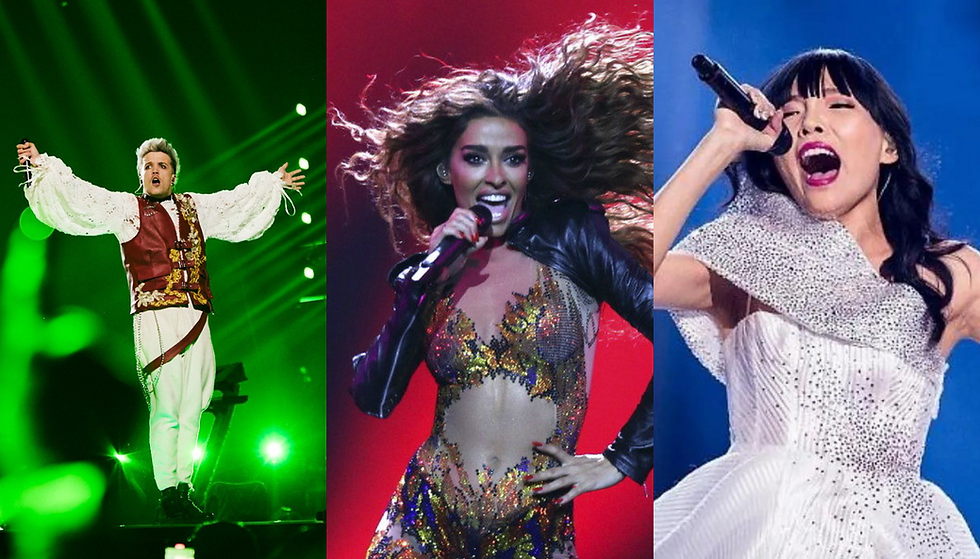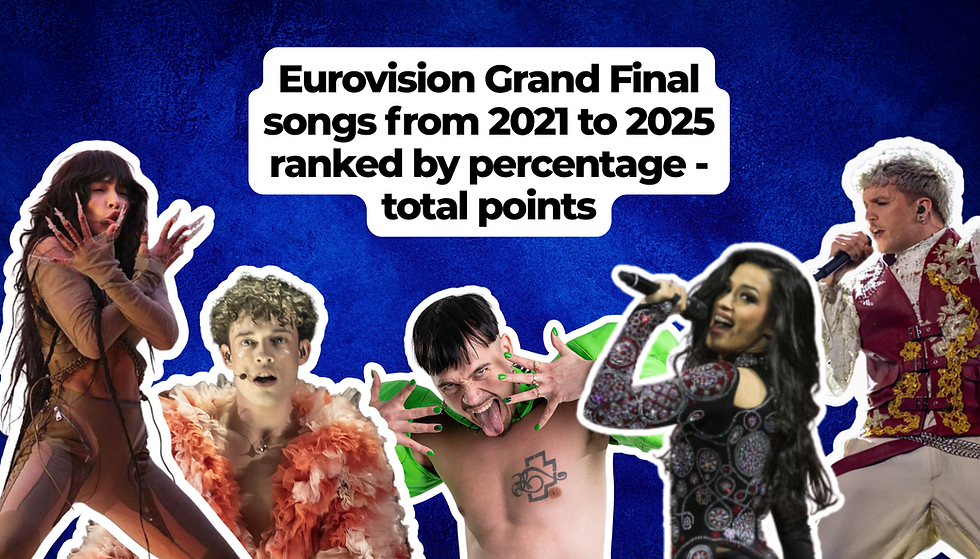Top 10 Eurovision songs of the 2000s by percentage
- Emma Garrie

- Aug 10, 2022
- 6 min read

The 2000s were the era of change for the Eurovision Song Contest.
Arguably the biggest change was the introduction of the semi-final system which saw the Contest able to accommodate many more countries. In a sign of the technological advances of the time, the Contest was broadcast online for the first time and the first official Eurovision CD and DVD were released.
Though some are no longer participating, 13 countries made their Eurovision debut during the 2000's which saw participants jump from 24 in 2000 to 43 by 2008.
A year ago we looked at the top 10 Eurovision songs of the 1980s, today we look back at the most popular songs of the 2000s by the percentage of total possible votes, with some surprising results and omissions!
10. Ira Losco - '7th Wonder' (Malta 2002)
2nd place - 164 points out of 276 (59.42%)
20 year old Ira Losco achieved Malta's highest ever Eurovision placing at the time, receiving votes from every other country except Romania (including three sets of 12 points). Ira was joined on stage by five Estonian backing singers, much to the delight of the Estonians who were hosting the Contest for the first time after their inaugural win in 2001.
Countrywoman Chiara equalled the record three years later but Malta still remain without a win in the Contest. Ira returned to Eurovision in 2016 whilst six months pregnant with her first child, finishing 12th with 'Walk on Water'.
9. Sakis Rouvas - 'Shake It' (Greece 2004)
3rd place - 252 points out of 420 (60%)
2004 saw a then record 36 countries take part in the Contest, due to the introduction of the semi-final system (ten more than in 2003).
Sakis Rouvas, a singer, actor and former athlete, received points from every other country including five sets of 12 points. 'Shake It' incidentally scored 22 points higher than Greece's winning entry from Helena Paparizou a year later (which only finished 21st on this list). The single topped the charts for several weeks in both Greece and Cyprus where it reached 4 times platinum, making it one of the most successful songs in Greek music history.
Sakis went on to co-host Eurovision 2006 in Athens after Greece's first win with 'My Number One' in 2005.
8. Željko Joksimović & Ad Hoc Orchestra - 'Lane moje' (Serbia & Montenegro 2004)
2nd place - 263 points out of 420 (62.62%)
Serbia and Montenegro made their Eurovision debut in 2004 with 'Lane moje' becoming the first non-winning song to score over 200 points (along with Greek entry 'Shake It'). They received points from every other country including seven sets of 12 points.
Interestingly, Željko actually won the semi-final by seven points over the eventual winner Ukraine (who took out the Grand Final by 17 points). 'Lane moje' was one of only two entries to compete for Serbia & Montenegro, with the country withdrawing from the competition in 2006 and competing as separate countries of Serbia and Montenegro from 2007 onwards.
Joksimović went on to compose the entries for Bosnia and Herzegovina (2006), Serbia (2008) and Montenegro (2015), hosted the 2008 Contest and competed again for Serbia in 2012 where he finished third.
7. Marie N - 'I Wanna' (Latvia 2002)
1st place - 176 points out of 276 (63.77%)
Marie N gave Latvia their first and only Eurovision win, however this was probably due to the staging rather than the song itself.
Marie dazzled the crowd with an elaborate costume reveal which saw her begin the performance dressed in a white suit and finish wearing a red dress. Just like Malta's Ira Losco (10th on this list), points were received from every country except Romania including five sets of 12 points.
Despite the amazing stage show, the song itself didn't see the chart success of previous winning entries. It became the first winning song not to be released outside it's own country and didn't even crack the Top 30 in Latvia although Marie went on to co-host the Contest in 2003.
6. Ruslana - 'Wild Dances' (Ukraine 2004)
1st place - 280 points out of 420 (66.67%)
Ruslana took out the win for Ukraine in a Contest which saw all the top three songs score over 200 points for the first time. Despite finishing second in the semi-final, Ruslana stormed home in the Grand Final to win over semi-final winner Serbia & Montenegro by 17 points.
'Wild Dances' received votes from every country except Switzerland including eight sets of 12 points. The song became the first to be sung partly in a language other than English since the 1999 rule change when countries were no longer required to sing in their official language.
It topped the charts not only in Ukraine but also in Greece and Belgium where it spent ten weeks at Number 1. In the years since, Ruslana has been appointed advisor to the Ukrainian prime minister, judged on The Voice Ukraine and been an active member of the Ukrainian peace movement.
5. Rollo & King - 'Never Ever Let You Go' (Denmark 2001)
2nd place - 177 points out of 264 (67.05%)
With a song that may well have won the Contest in many other years, Rollo & King finished in 2nd place by just 21 points, receiving votes from all but three countries, including six sets of 12 points.
The group made up of Søren Poppe, Stefan Nielsen and Signe Svendsen were asked to enter Dansk Melodi Grand Prix by Danmarks Radio after their debut album topped the Danish charts a year before. The group released one further album after Eurovision before Signe went on to have a successful solo career in Denmark.
4. Lordi - 'Hard Rock Hallelujah' (Finland 2006)
1st place - 292 points out of 432 (67.59%)
'Hard Rock Hallelujah' became the first ever hard rock/heavy metal song to win the Contest and gave Finland their first and only Eurovision win. At the time, it broke the record for the most points achieved at Eurovision but lost this record to Norway in 2009. It received votes from all but three countries including eight sets of 12 points and was the first country to win both the Grand Final and semi-final since its inception in 2004. The song topped the charts in Finland and was also successful in several other European nations.
Lordi, who are renowned for their masked performances in monster themed costumes, have gone on to produce a further eight albums since their Eurovision performance and released their latest single just last month.
3. Olsen Brothers - 'Fly on the Wings of Love' (Denmark 2000)
1st place - 195 points out of 276 (70.65%)
The Olsen Brothers won the contest for Denmark for the second time after leading the vote from start to finish. 'Fly on the Wings of Love' received votes from all but two countries including eight sets of 12 points. The song reached number 1 in Denmark and Sweden and charted in several other European nations.
Brothers Jørgen and Niels had already had numerous hit singles in Denmark throughout the 1970's and 1980's and their combined ages (50 and 46) made them the oldest aged act ever to win the Contest, a record that still stands today. The brothers attempted to represent Denmark again in 2005 but finished second at the Danish national final.
2. Tanel Padar, Dave Benton & 2XL - 'Everybody' (Estonia 2001)
1st place - 198 points out of 264 (75%)
Estonia achieved its first and only win in 2001, becoming the first former Soviet country to win the Contest.
'Everybody' received nine sets of 12 points and polled votes from every country except Portugal. Dave Benton (Efrén Eugene Benita), who originally hailed from Aruba, became the oldest singer to ever win Eurovision at the age of 50 years 101 days. Tanel started his own rock band two years after his Eurovision appearance called Tanel Padar & The Sun. They had a number of hits in Estonia in the mid-2000's. 2XL (now known as Soul Militia) attempted to represent Estonia again in 2007. Carrying on the family tradition, Dave's daughter Sissi attempted to compete at Eurovision and came second at the Estonian National Final Eesti Laul in 2021.
1. Alexander Rybak - 'Fairytale' (Norway 2009)
1st place - 387 points out of 492 (78.66%)
It was a landslide victory for the enthusiastic violinist, Alexander Rybak, taking the win over Iceland by a massive 169 points.
'Fairytale' received votes from every other country with 35 of the 41 competing nations having the song in their top three and a massive 16 countries awarding it their "douze" points. It was the highest tally ever achieved by a country in the history of Eurovision under the voting system in use at the time. It also took the record for the most amount of 12 points a country had ever been awarded (both records have since been broken).
The song reached number one in various European countries and even cracked No. 67 on the Australian ARIA chart. Alexander went on to represent Norway again in 2018 finishing 15th in the Grand Final.
Other Winning Songs
Believe it or not, four winners also missed out on the top 10! Turkey's Sertab finished 13th with 55.67% of the total possible points with 2003's 'Everyway That I Can', 2007 winner Marija Serifovic had 54.47% to land in 17th place with 'Molitva' for Serbia, 'Believe' for Dima Bilan was 18th with 53.97% and Helena Paparizou from Greece was in 21st place with 'My Number One' achieving 50.44%.
What about Verka?
One of the decades most memorable Eurovision entries was 2007 runner-up Verka Serduchka with 'Dancing Lasha Tumbai' who finished 33 points behind winners, Serbia. Like Marija Serifovic, the 2007 Ukrainian entry's percentage suffered, in another year where the top three songs all scored over 200 points. The song finished 23rd in our list with 47.76%.
For continued updates on all the Eurovision news follow Aussievision on Facebook, Twitter and Instagram. All links at: https://linktr.ee/aussievisionnet



google 优化 seo技术+jingcheng-seo.com+秒收录;
Fortune Tiger Fortune Tiger;
Fortune Tiger Fortune Tiger;
Fortune Tiger Fortune Tiger;
Fortune Tiger Slots Fortune…
站群/ 站群
gamesimes gamesimes;
03topgame 03topgame
EPS Machine EPS Cutting…
EPS Machine EPS and…
EPP Machine EPP Shape…
Fortune Tiger Fortune Tiger;
EPS Machine EPS and…
betwin betwin;
777 777;
slots slots;
Fortune Tiger Fortune Tiger;
google seo…
03topgame 03topgame;
gamesimes gamesimes;
Fortune Tiger…
Fortune Tiger…
Fortune Tiger…
EPS Machine…
EPS Machine…
seo seo;
betwin betwin;
777 777;
slots slots;
Fortune Tiger…
seo优化 SEO优化;
bet bet;
google seo google seo技术飞机TG-cheng716051;
03topgame 03topgame
Jogos JOGOS
Fortune Tiger Fortune Tiger;
Fortune Tiger Slots Fortune Tiger…
Fortune Tiger Fortune Tiger;
EPS машины EPS машины;
Fortune Tiger Fortune Tiger;
EPS Machine EPS Cutting Machine;
EPS Machine EPS and EPP…
EPP Machine EPP Shape Moulding…
EPS Machine EPS and EPP…
EPTU Machine ETPU Moulding Machine
EPS Machine EPS Cutting Machine;
谷歌seo优化 谷歌SEO优化;
Fortune Tiger Fortune Tiger;
Fortune Tiger Fortune Tiger;
Fortune Tiger Slots Fortune…
Fortune Tiger Fortune Tiger;
Fortune Tiger Fortune Tiger;
Fortune Tiger Slots Fortune…
EPS машины EPS машины;
ETPU машины ETPU машины;
EPP машины EPP машины;
谷歌seo优化 谷歌SEO优化;
Fortune Tiger Fortune Tiger;
Fortune Tiger Fortune Tiger;
Fortune Tiger Slots Fortune Tiger Slots;
Fortune Tiger Fortune Tiger;
Fortune Tiger Fortune Tiger;
Fortune Tiger Slots Fortune Tiger Slots;